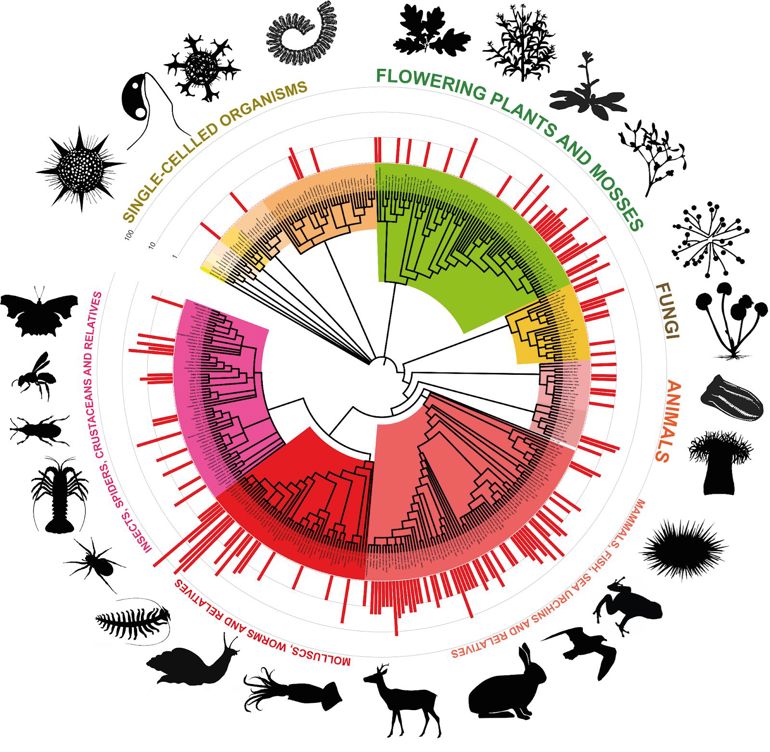An ambitious project to sequence the genomes of all eukaryotic species found in Britain and Ireland has passed a major milestone.
Over 1,000 genomes have now been produced as part of the Darwin Tree of Life project - a collaboration between the Royal Botanic Garden Edinburgh and nine other leading research organisations and funded by Wellcome.
While the list of 1,000 species includes animals, plants, fungi and single-celled organisms called protists, the 1,000th species was Cosmorhoe ocellata, a moth commonly called ‘The Purple Bar’. All of the data generated are available freely and openly to researchers anywhere in the world.
The Darwin Tree of Life project aims to use DNA data to understand how the diversity of life on Earth evolved, explore the biology of organisms and ecosystems, aid conservation efforts, and provide new tools for medicine and biotechnology.
It is one of several initiatives across the globe working towards the ultimate goal of sequencing all complex life on Earth, in a venture known as the Earth BioGenome Project.
Professor Mark Blaxter, Head of the Tree of Life programme at the Wellcome Sanger Institute, said: “It’s a huge achievement to pass this milestone - and it has only been possible through the remarkable collaboration, hard work, and innovation of people from all of the project partners over the first four years of our groundbreaking project.
“All of us are connected by the common thread of our shared DNA, and DNA connects us to all life. Genomics allows us to explore those connections and look back through evolutionary time at the tree of life.
“The outputs and impacts from the Darwin Tree of Life will contribute to open conversations about how genomic knowledge can help us start to tackle some of the biggest problems facing our societies and the natural world today.”
Dr Michelle Hart, who heads the Royal Botanic Garden Edinburgh team invested in the Darwin Tree of Life project explained: "The Darwin Tree of Life genome sequences are providing completely new insights into biodiversity and critically important information to support its conservation. This collaboration, bringing together biodiversity scientists and genomic scientists, is now delivering at a rapid and accelerating pace and the 1000th genome is a great achievement.”
Dr Alex Twyford, Senior Lecturer in Botany at the University of Edinburgh, emphasised the importance of the partnership, adding: “The Darwin Tree of Life project is transforming how we do biology, allowing us to study the genetics of all species in Britain and Ireland. This includes the iconic European mistletoe, which is the largest plant genome ever studied. We are learning how plants have evolved different strategies to survive challenging and changing environments.”
There are estimated to be about 70,000 eukaryotic species - organisms whose cells have a nucleus - in Britain and Ireland.
While today’s milestone represents only a fraction of the total, much of the work of the past 4 years has involved the development of protocols and pipelines required to generate reference quality genomes from never-before-sequenced species.
Species analysed by the Darwin Tree of Life project so far have come from across the many branches of the tree of life, from single celled organisms (also known as protists) to the more familiar plants, fungi, and animals.
The Darwin Tree of Life partners are the Earlham Institute, EMBL-EBI, Marine Biological Association, Natural History Museum, Royal Botanic Garden Edinburgh, Royal Botanic Garden Kew, and the Wellcome Sanger Institute, along with teams at the Universities of Cambridge, Edinburgh and Oxford.

The “tree” here is the taxonomic tree of the organisms analysed, coloured by major group. The red bars on the outside of the tree show how many species have been sequenced in each Order of organisms. Graphic by Mark Blaxter for DToL. Organism silhouettes from PhyloPic CCBY-4.0.
Main image: Genomic science in progress, two of Dr Michelle Hart’s team at work in the RBGE labs.

